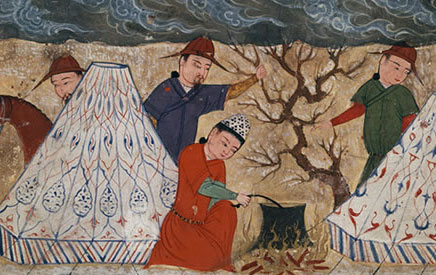
Khubilai Khan and Chabi on a Cookout (detail), Bibliothèque nationale de France, Paris
One other influential advisor was [Khubilai Khan's] remarkable second wife, Chabi. Her early life remains a mystery: the Persian accounts scarcely mention her, and only a few Chinese texts yield much information about her. We know that she and Khubilai were married just before 1240, because her son was born in that year, but nothing is known of her life between 1240 and the eve of Khubilai's accession as Great Khan in 1260. Contemporary sources hardly mention Khubilai's first wife, Tegulun (Chinese: T'ieh-ku-lun), or his two other principal wives, Tarakhan and Bayaghuchin. He had four households (Mongolian: ordo), each supervised by a main wife under whom were a number of subordinate wives and concubines. The only ordo that is accorded much attention in accounts of the period is Chabi's, the second.
The attention to Chabi is warranted, for she had a great impact on Khubilai, influencing, for example, his views on religion. She was an ardent Buddhist and was, in particular, attracted by Tibetan Buddhism. She gave her first-born son a Tibetan name (Dorji, b.1240, from Tibetan rDo-rje). There is no specific evidence that she induced Khubilai to invite Buddhist monks to his territory before he became the Great Khan, but she certainly did not dampen his enthusiasm for conversations about Buddhism with [the monk] Hai-yun, and she may have encouraged Khubilai in his desire to unravel the complexities of Buddhist doctrine. She herself donated some of her jewelry to Buddhist monasteries.
Chabi was the ideal helpmate in Khubilai's effort to rule China. It was she, for instance, who urged him to return to the North from his campaign against the Song and counter the threat of [his brother] Arigh Boke. Without her timely warning, Khubilai would have been in a weaker position to cope with his brother. She aspired to be the empress of a powerful state, not simply the wife of a tribal chieftain. She had wide-ranging interests and was not limited by Mongol pastoral traditions. In the early years of Khubilai's reign, for example, four members of the Imperial Guard, according to the Yuan shi, proposed that the areas around his capital be turned into pastureland for the Mongol horses. This proposal fit in with the traditional Mongol economy, but it made little sense in the agrarian economy of North China. Chabi sensed the folly of the proposal and objected violently. She reprimanded Liu Bing-Zung, one of the most influential of Khubilai's Chinese advisors, for not speaking up against the proposal, noting, "You Chinese are intelligent. When you speak, the emperor listens. Why have you not remonstrated him?" Khubilai quickly rejected the proposal. The Mongol nobles were thus not permitted to encroach on the agricultural land of the Chinese peasants who lived around the capital.
Chabi's personality, interests, and activities eventually initiated trends at court. She was regarded as extremely frugal and rarely threw anything out, and numerous perhaps stereotyped anecdotes about her parsimoniousness appear in her biography in the Yuan shi. With her encouragement, the court ladies collected the strings from old bows and made them into thread, which could then be woven for cloth. She salvaged old animal pelts and used them as rugs. Her practicality is also evident in the new fashions she introduced. Khubilai was concerned that Mongol hats were "without a front" and that those who wore them received little protection from the blazing desert sun. So Chabi designed hats with a rim, and Khubilai ordered all new hats to be modeled on Chabi's creation. Later she designed a sleeveless garment that could be worn comfortably in combat.
She was also in fashion when she expressed an interest in earlier rulers of China. Like Khubilai, she was entranced by the great Emperor Tai-tsung of the Tang dynasty, and she prodded a Chinese scholar to explain the exploits and the character of the Tang ruler of the court. Since Tang Tai-tsung was the most renowned emperor of the last truly powerful Chinese dynasty, it is only natural that Khubilai would wish to emulate him and that Chabi would invite comparisons between her husband and the illustrious Tang ruler. Chabi and Khubilai must have realized that it would be easier for Khubilai to govern the Chinese if he succeeded in identifying himself with a major figure in the Chinese tradition. In sum, Chabi was just as anxious as her husband to set up a government in China.